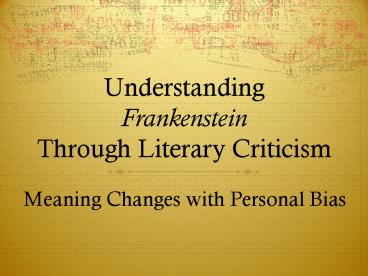Understanding Frankenstein Through Literary Criticism - PowerPoint PPT Presentation
1 / 18
Title:
Understanding Frankenstein Through Literary Criticism
Description:
Understanding Frankenstein Through Literary Criticism Meaning Changes with Personal Bias Map Explanation: I have placed the work itself in the center of my map ... – PowerPoint PPT presentation
Number of Views:200
Avg rating:3.0/5.0
Title: Understanding Frankenstein Through Literary Criticism
1
UnderstandingFrankensteinThrough Literary
Criticism
- Meaning Changes with Personal Bias
2
A Critic
- One who expresses a reasoned opinion on any
matter especially involving judgment of its
value, truth, righteousness, beauty, or
technique.
3
A Literary Critic
- The evaluative or interpretive work written by
professional interpreters of texts - Criticism not because it is negative, but
because it asks hard, analytical, crucial, or
critical questions about the work
4
A Literary Critics Approach
- Uses Literary Theory to guide the analysis and
interpretation of the work - Literary Theory has five basic points of view
- The real world as it connects to the work
- The authors life and times as influencing the
work - The moral implications of the work
- The structure of the work itself
- The relationship of the work to earlier works
5
In other words
- Critics use different lenses use to view and talk
about art, literature, and even culture which - consider works of art based on certain
assumptions within a school of theory - focus on particular aspects of a work they
consider important to the meaning as a whole
6
What are the types of Literary Criticism?
7
In short
- Lit. Crit. helps the reader
- Resolve a question, problem, difficulty in the
reading - Decide which is the more accurate of conflicting
readings - Form judgments on the artistic merit of a work
8
Which Lenses We Will Use Today
- Psychoanalytic
- Feminist
- Post Colonial
- Archetypal / Symbolic
9
The Theories in BriefPsychoanalytic
- The psychological motivation of characters and
imagery - Freud influences of a characters id
(instincts, pleasure seeking) ego (What you
consciously want), and superego (the moral
governing principle that keeps the ID and Ego in
check its consequences and repercussions.) - Jung the process of individuation (what makes
one different form everyone else). Three parts of
the self the shadow, or the darker, unconscious
self the persona, or a man's social personality
and the anima, or a man's "soul image. A
neurosis occurs when someone fails to assimilate
one of these unconscious components into his
conscious and projects it on someone else instead
10
Guiding QuestionsPsychoanalytic Theory
- How do the operations of repression structure or
inform the work? - How can characters' behavior, narrative events,
and/or images be explained in terms of
psychoanalytic concepts of any kind? - Are there prominent words in the piece that could
have different or hidden meanings? Could there be
a subconscious reason for the author using these
"problem words"?
11
The Theories in BriefFeminist
- The impact of gender on meaning
- A critique of patriarchal culture where women are
marginalized - Argues that male fears are represented through
women
12
Guiding QuestionsFeminist Theory
- How is the relationship between men and women
portrayed? - What are the power relationships between men and
women? - What does the work reveal about the operations
(economically, politically, socially, or
psychologically) of patriarchy?
13
The Theories in BriefPost-Colonial
- looks at issues of power, economics, politics,
religion, and culture - Questions whether the work reinforces or
criticizes colonial hegemony (dominant culture
controls and defines the weaker)
14
Guiding QuestionsPost-Colonial Theory
- How does the literary text, explicitly or
allegorically, represent various aspects of
colonial oppression? - What person(s) or groups does the work identify
as "other" or stranger? How are such
persons/groups described and treated? - How does the text respond to or comment upon the
characters, themes, or assumptions of a canonized
(colonialist) work?
15
The Theories in BriefArchetypal / Symbolic
- assumes that there is a collection of symbols,
images, characters, and motifs (i.e. archetypes)
that evokes basically the same response in all
people - Some common archetypes
- Garden paradise, Desert spiritual emptiness
- Red passion, Green growth, fertility
- Serpent evil, wisdom, destruction
- Hero archetype - quest, initiation (separation,
transformation, return), scapegoat - Biblical, Mythical allusions
16
Guiding QuestionsArchetypal / Symbolic Theory
- How does the work use imagery to develop its own
symbols? (i.e. making a certain road stand for
death by constant association) - Is there a central symbol or focal point that can
be said to sum up the entirety of the work? - How does the imagery and characterization connect
to the associations with the archetype?
17
Your Task
- 1. Read the passage through the assigned critical
theory lens. - 2. As a group, annotate the text, underlining
important words and sentences. - 3. Discuss the meaning of the passage. Keep in
mind that you are reading the passage through the
eyes of the literary critic that you were given.
Ask yourself, "What would this sort of critic
look for? Why is it important? - 4. After discussion, construct a paragraph
interpreting the passage through your lens.
Use the guiding questions to help frame your
analysis.
18
Group Roles
- Recorder take notes on the discussion
- Manager guide discussion through the questions,
keep group on task (in other words, manager keeps
it focused on the critical theory) - Researcher (s) anchor discussion in the text
(in other words, researchers ground the
discussion in the work)































